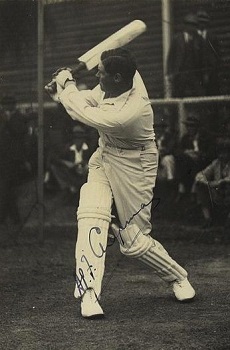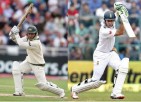A review of England captains
Dave Wilson |
In 1921 the Grand Old Man of English cricket, Sir Pelham “Plum” Warner, founded The Cricketer magazine. This month, the magazine runs a feature on the best ever England captains, though their founder does not feature in the magazine’s top ten. Warner skippered England from 1903-1906, winning four out of ten Tests with no drawn matches. Winning fewer Tests than you lose is probably not going to get you listed on any all-time list of skippers, not even England skippers, and indeed all of the Cricketer’s top ten enjoy a positive win-loss ratio – here they are, ranked on number of matches spent calling the toss (as of the beginning of the fifth Test in India – win% calculated using a draw as half a win):-
| CAPT | MTCH | WON | DRAWN | LOST | WIN% |
| Vaughan | 51 | 26 | 14 | 11 | 0.647 |
| Strauss | 50 | 24 | 13 | 11 | 0.630 |
| Hussain | 45 | 17 | 13 | 15 | 0.522 |
| May | 41 | 20 | 11 | 10 | 0.622 |
| Brearley | 31 | 18 | 9 | 4 | 0.726 |
| Illingworth | 31 | 12 | 14 | 5 | 0.613 |
| Hutton | 23 | 11 | 8 | 4 | 0.652 |
| Chapman | 17 | 9 | 6 | 2 | 0.706 |
| Jardine | 15 | 9 | 5 | 1 | 0.767 |
| Grace | 13 | 8 | 2 | 3 | 0.692 |
In terms of total wins, Vaughan is top with 26, followed by Strauss (and Cook, who is not in their top ten) on 24, then May. Looking at win percentage, Jardine ranks first, with just one defeat in 15 Tests, followed by Mike Brearley then Percy Chapman. Of course, it’s difficult to separate the captain from his squad – was Peter May successful because he had the likes of Cowdrey, Graveney, Compton, Barrington, Dexter, Bailey, Trueman, Statham, Laker and Lock to call upon, or because he was a great captain? A little of both, perhaps? See this piece for a further discussion on that score.
Speaking of Cowdrey, the great batsman was perhaps too mild mannered to hold onto the top job, and we can highlight that by looking at the number of Tests as captain compared to the total number of Tests played between their debut and final Tests (note that I’m only considering players who captained at least ten Tests; the list below shows the top five then bottom five):-
| CAPT | SPAN | AS CAP | %AGE |
| Brearley | 39 | 31 | 79.5% |
| Douglas | 35 | 18 | 51.4% |
| May | 84 | 41 | 48.8% |
| Strauss | 106 | 50 | 47.2% |
| Hussain | 96 | 45 | 46.9% |
| – | – | – | – |
| Gatting | 180 | 23 | 12.8% |
| Willis | 18 | 143 | 12.6% |
| Stewart | 15 | 133 | 11.3% |
| Flintoff | 11 | 142 | 7.8% |
| Botham | 12 | 156 | 7.7% |
Not too much of a surprise to see Brearley top of this list and by a significant margin, as his prowess as a leader of men far outweighed his abilities as a batsman; the same can be said of “Johnny Won’t Hit Today” Douglas. Flintoff and Botham were both talsimanic team members who could not transfer their cricketing legerdemain to that of motivating spearhead. The aforementioned Cowdrey finished just ahead of Gatting on 13.9%.
There are a number of other ways to compare the performance of the captains – first, win percentage, which I touched on briefly earlier:-
| CAPT | TESTS | WIN% |
| Jardine | 15 | 0.767 |
| Brearley | 31 | 0.726 |
| Chapman | 17 | 0.706 |
| Grace | 13 | 0.692 |
| Hutton | 23 | 0.652 |
| – | – | – |
| Stewart | 15 | 0.367 |
| Maclaren | 22 | 0.341 |
| Botham | 12 | 0.333 |
| Gower | 32 | 0.297 |
| Flintoff | 11 | 0.273 |
Jardine was a decidedly better batsman than Brearley, and who knows what he may have achieved had he not pissed off all and sundry. Botham is the only England captain with at least ten Tests in charge not to skipper his team to a single victory. Despite the benefit of the requisite background to lead his country, at least at that time, Archie Maclaren “lacked the buoyant optimistic temperament so necessary for complete success in cricket and was easily upset by disagreement with selectors”, as was noted in his Wisden obituary.
Going back to Peter May and the very stong England side of the late 1950s, to try and get a picture of the impact which May had as captain we can compare the team’s record with him as captain as compared its performance with other captains over the duration of May’s career; here are the top win/loss records of each of the England teams during the relevant captain’s playing career:-
| CAPT | SPAN W/L |
| Brearley | 0.692 |
| Jardine | 0.667 |
| Grace | 0.640 |
| May | 0.637 |
| Douglas | 0.600 |
Certainly in the case of Douglas, Jardine and Brearley, their playing careers largely coincide with their spell in the captaincy. Here is a comparison of the W/L record as captain compared to the career span W/L:-
| CAPT | W/L | SPAN | RATIO |
| Hutton | 0.652 | 0.532 | 1.225 |
| Chapman | 0.706 | 0.578 | 1.220 |
| Vaughan | 0.647 | 0.561 | 1.154 |
| Jardine | 0.767 | 0.667 | 1.150 |
| Grace | 0.692 | 0.640 | 1.081 |
In each case, it looks like these captains took over squads which were basically winners during their career. However, the span records above include each captain’s spell as leader, therefore we should really exclude those matches:-
| CAPT | W/L | NC-SPAN | RATIO | DIFF |
| Chapman | 0.706 | 0.515 | 1.371 | +0.191 |
| Hutton | 0.652 | 0.493 | 1.323 | +0.159 |
| Vaughan | 0.647 | 0.492 | 1.315 | +0.155 |
| Brearley | 0.726 | 0.563 | 1.290 | +0.163 |
| Jardine | 0.767 | 0.621 | 1.234 | +0.145 |
Of the top five “improvers”, Hutton and Vaughan turned losers into winners. No one else could boast that turnaround, though Chapman has the largest differential in W/L record. Below is the opposite list, i.e. those with the largest negative impact in matches skippered vs matches as one of the troops:-
| CAPT | W/L | NC-SPAN | RATIO | DIFF |
| Flintoff | 0.273 | 0.573 | 0.476 | -0.300 |
| Gower | 0.297 | 0.513 | 0.579 | -0.216 |
| Warner | 0.400 | 0.638 | 0.638 | -0.238 |
| Maclaren | 0.341 | 0.538 | 0.633 | -0.198 |
| Botham | 0.333 | 0.486 | 0.686 | -0.153 |
Looking now at the skippers ranked based on the differential improvement:-
| CAPT | W/L | NC-SPAN | RATIO | DIFF |
| Chapman | 0.706 | 0.515 | 1.371 | +0.191 |
| Brearley | 0.726 | 0.563 | 1.290 | +0.163 |
| Hutton | 0.652 | 0.493 | 1.323 | +0.159 |
| Vaughan | 0.647 | 0.492 | 1.315 | +0.155 |
| Jardine | 0.767 | 0.621 | 1.234 | +0.145 |
This is the same list as based on ratio of improvement, with Brearley moved ahead of Hutton and Vuaghan. Those who saw the most negative differential:-
| CAPT | W/L | NC-SPAN | RATIO | DIFF |
| Flintoff | 0.273 | 0.573 | 0.476 | -0.300 |
| Warner | 0.400 | 0.638 | 0.638 | -0.238 |
| Gower | 0.297 | 0.513 | 0.579 | -0.216 |
| Douglas | 0.500 | 0.706 | 0.708 | -0.206 |
| Wyatt | 0.438 | 0.636 | 0.688 | -0.198 |
| Maclaren | 0.341 | 0.538 | 0.633 | -0.198 |
Flintoff’s travails during the 2006-07 Ashes will be well-known to readers of Cricketweb, though only three of his party had ever previously played a Test in Australia. Plum Warner took a vastly under-strength squad to South Africa in the winter of 1905-06 – none of the top batsmen who had faced the Australians that summer made the trip, including Fry, Hayward, Jackson, Maclaren and JT Tyldesley, nor did all-rounders Hirst and Rhodes. Not surpringly, a good South African side including Aubrey Faulkner and the four spinners Vogler, SInclair, Snooke and Schwartz was able to see of the England side 4-1. Gower had the misfortune of having to lead his men against the West Indians of the 1980s not once but twice, losing 5-0 on each occasion.
Like FIntoff, Johnny Douglas also presided over a 5-0 drubbing at the hands of the Aussies, in his case taking a side debiliated by war to face Australia. However Bob Wyatt may be the only England cricketer to have received death threats on his appointment, after succeeding the very popular Percy Chapman.
Chapman’s record hides an interesting chronology, his W-D-L record of 9-6-2 began with nine consecutive wins, followed by his final eight games without a single win. A three-Test series against a pre-Headley West Indies took him to a 4-0 record, followed by a strong Ashes showing taking him to 8-0 overall. Two factors then led to a turnaround in Chapman’s fortunes as captain – one was the MCC once again sending an under-strength side to South Africa, but before that Chapman had to send his troops to face an emerging Don Bradman in 1930, as the young master set a five-Test batting record which stands to this day. After the South Africa tour Wisden editor Stewart Caine, noting that Chapman having lost all form with the bat (due possibly to what was a lifestyle based very much on carpe diem) would call for the appointment of Jardine for the forthcoming winter trip to Australia. Well, we all know how that turned out. You can read more about Chapman in Martin’s feature here.
There are 32 captains who have skippered England in ten or more Tests, and as mentioned earlier The Cricketer has nominated ten which they feel are particularly deserving of consideration by readers when voting. As a final look, I decided to rank all 32 based on a number of factors, most of which are described above, then totalling the rankings to provide a final rating – this is how they rank:-
| RK | PLYR |
| 1 | Percy Chapman |
| 2 | Michael Vaughan |
| 3 | Mike Brearley |
| 4 | Douglas Jardine |
| 5 | Len Hutton |
| 6 | Andrew Strauss |
| 7 | WG Grace |
| 8 | Ray Illingworth |
| 9 | Peter May |
| 10 | Nasser Hussain |
As it happens, these are the same ten highlighted by The Cricketer. Not that I’m suggesting anyone base their vote on this piece, but it’s nice to know the same ten rank highest here too.
No place for founder Plum though.





Leave a comment